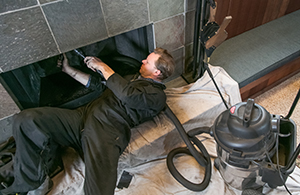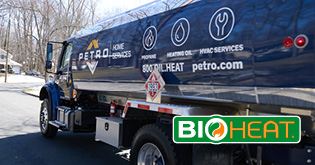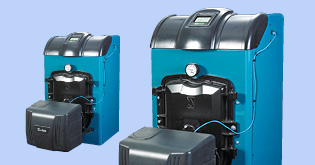- My Account:
- Sign In
- Register
- Make Payment

Why fireplace safety and cleaning your chimney matter.

A large number of house fires start when creosote (a carbonaceous chemical) builds up on the interior of your chimney. Even so, some homeowners continue to disregard this significant risk, and don’t take proper measures when it comes to chimney cleaning. When houses were heated by fireplaces only, prior to the Industrial Revolution, chimney sweeps were in demand as 19th century homeowners seemed to realize how important a clean chimney was to avoiding home fires.
In the 21st century, avoiding a house fire is just as important. Even though most contemporary homeowners use their fireplaces for coziness or have remote controlled natural gas flames to fuel their fires, the majority still use wood to burn and are susceptible to creosote buildup in their dampers and flues. Homeowners are urged to have their chimneys inspected for creosote buildup and cleaned if necessary in the spring of each year.
Chimney fires are characterized by loud cracking or popping noises and a lot of dense smoke from the flue, but often times go undetected by the homeowner. Chimney fires are often explosive, and it is common for neighbors to hear the explosions and alert the homeowner. Chimney fires can burn at extremely high temperatures (up to 2,000 degrees F).
These super-hot fires will weaken masonry chimney structure after creosote residue builds up in sufficient quantities. The conditions that tend to attract creosote buildup include the natural lack of air supply in chimneys, burning wood that lacks enough seasoning, and cool chimney temperatures that occur in four-season environments. Overloading your firebox to get longer fires can also contribute to creosote residue buildup in your chimney.

How often do chimney fires happen?
Chimney Safety Institute of America (CSIA) statistics indicate there are more than 25,000 chimney fires annually in the US. These cause over $125 million in property damage, but, if they spread to occupied homes the measurement of human deaths and injuries is impossible to compute.
How often should you get your chimney cleaned?
You should have an annual chimney inspection by a reputable chimney sweep organization such as Petro. Depending on how often you use your fireplace to burn wood, creosote residue will build up in your chimney. There are many factors that influence the amount of creosote stuck to the walls of your chimney, such as the volume of airflow into your chimney and the burning of improperly seasoned wood, which encourages such a buildup. Creosote will also build up in the flue if you have unburned wood in the firebox.
There is not a “hard and firm” rule of thumb on how often to clean your chimney. An examination by an experienced chimney sweep is the only way to learn if your chimney, whether masonry or metal, needs a cleaning.
Modern prefabricated metal chimneys are specially treated to withstand the high temperatures of a chimney fire without suffering severe damage. Should they suffer damage from a chimney fire, the professional recommendation is to no longer use the chimney until you replace the unit.
Forms of preventative maintenance.
A common homeowner question: “How can I maintain the safety of my chimney between professional cleanings to avoid chimney fires?” There are things homeowners can do to better avoid often dangerous chimney fires. Here are a few steps homeowners can take:
- Do not let ashes gather in the firebox. Clean them out if they are accumulating.
- Be sure to only use seasoned firewood in your fireplace. If you gather it yourself, season it for a year or more before you burn it. If you buy it from a vendor, ensure that the firewood company only offers seasoned wood.
- Ensure the damper is entirely open BEFORE lighting a fire in the firebox.
- Do not burn pressure-treated or painted wood in the fireplace. This will hasten creosote buildup (pressure-treated wood) or potentially create toxic fumes (painted wood) that are dangerous to your family members.
- Put the largest logs on the bottom of the firebox, followed by smaller logs on top. Why? The fire will burn hotter and produce less smoke. Top that pile with kindling (around one inch) and crushed newspaper to get the fire started properly. This method will retard residue buildup in your chimney.
- Have an annual inspection of your chimney by a professional. Hire an experienced, reliable chimney sweep to mechanically clean your chimney, removing tar and creosote.
Can you get away with only using “chimney sweeping logs?”
It is not really the logs that do much, but the chemicals within them. Some “chimney sweeping log” products claim to assist retarding creosote buildup, and some of them do so. Those that are somewhat effective in maintaining your chimney between cleanings contain chemicals similar to the chemicals used by chimney sweeps for professional cleanings.
The chemicals are carried up the flue by the rising exhaust from the safe fire in your fireplace. These logs break down the residue coating the inside of your chimney, but many experts have a problem with the marketing strategy for these products.
If you read the “fine print” disclosures for these logs, you will see that the chemicals embedded in them are labeled “might (the operative word) reduce creosote by as much as 60 percent.” However, the Washington Public Fire Educators Association refutes this by publishing the following statement. “The use of chimney sweeping logs (and similar products) alone is not an adequate substitute for mechanical chimney cleaning and inspection because it does not provide for the same level of protection to the chimney system. Every time you burn wood in your fireplace or wood stove, tar and creosote (highly flammable) are formed and over time build up on the inside of your chimney.”
The bottom line: Do not rely on chimney sweeping logs instead of having a professional chimney sweep clean your chimney. While they can help you maintain your chimney between professional chimney sweep cleanings, they do not replace the need for regular chimney inspections and cleanings.
Hiring a chimney sweep.
When you do not want to take a chance, get recommendations for an insured, reputable professional, like Petro Home Services. A certified chimney sweep, like the team at Petro, can make the inside of your chimney safe even if you only use it for ventilation of your furnace or heating system. Just as your furnace benefits from an annual tune-up, if you have and use your fireplace regularly an annual chimney inspection can improve your fuel use.
Your chimney is irrevocably wedded to your furnace and heating system. Even if you have not had your chimney swept in years because you do not have or use a fireplace, you still might need to clean your chimney. Call your local Petro Home Services location today to schedule a chimney inspection from the certified chimney services team.*
*Chimney services may not be available in all areas.
Petro Home Services is proud to not only serve communities in DC, CT, MA, MD, NJ, NY, PA, and RI but we also proudly acknowledge the skills and experience of our expert team behind all resources. With insights on topics ranging from heating oil facts to common air conditioning questions, you can rely on Petro Home Services for facts and information to help you understand more about your heating, cooling and home comfort needs. This article and all articles on the Petro Home Services website have been approved by our team of home service experts.






